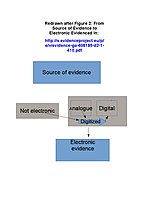
Photo from wikipedia
The CJEU has already confirmed that the European Evidence Regulation (EER) is not of a mandatory character and that a court may rely on its national law in order to… Click to show full abstract
The CJEU has already confirmed that the European Evidence Regulation (EER) is not of a mandatory character and that a court may rely on its national law in order to obtain evidence located abroad. Nevertheless, numerous dilemmas still exist. In the author’s view the CJEU’s findings in regard to the parties examined as witnesses can be extended to proper witnesses although this is still controversial concerning the question whether coercive measures may be used. The author is also of the opinion that it is not possible to organise cross-border videoconferences without resort to the EER, and finds it questionable whether a videoconference with a party located abroad, but not for purposes of taking evidence, falls within the scope of the EER. Finally, the problem is addressed as to whether the fair trial requirements oblige the court to apply the other available methods of cross border taking of evidence if the first chosen method fails.
Journal Title: ERA Forum
Year Published: 2017
Link to full text (if available)
Share on Social Media: Sign Up to like & get
recommendations!